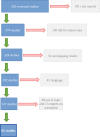Management and Future Therapeutic Perspectives of Classic Kaposi's Sarcoma: An Evidence-Based Review
- PMID: 39530040
- PMCID: PMC11552409
- DOI: 10.2147/OTT.S468787
Management and Future Therapeutic Perspectives of Classic Kaposi's Sarcoma: An Evidence-Based Review
Abstract
Background: Kaposi sarcoma (KS) is a cutaneous neoplasm of endothelial origin. The causative agent is the human herpes virus-8 (HHV-8) which, combined with an immune system impairment, causes cell proliferation. To date, high-quality evidence and treatment recommendations for the management of KS are confined to the acquired immune deficiency syndrome (AIDS)-related KS, while the clinical approach to the treatment of classic KS (CKS) is based on small retrospective case series and the experience of clinicians in selected referral centers.
Materials and methods: A search of the English literature was conducted through PubMed/MEDLINE databases for studies regarding CKS diagnosis, staging, and treatment, published between January 1990 and September 2023.
Results: Overall, 122 out of 565 articles were selected. Based on the results of this literature review, we proposed indications regarding the recommended flow chart for diagnosis, staging, and follow-up of patients with CKS. We assess available evidences regarding topic, locoregional, and systemic treatments of CKS. We also provide a focus on novel treatment strategies and therapeutic approaches currently under evaluation in clinical trials.
Conclusion: CKS is a rare disease and its management requires a multidisciplinary assessment. Treatment in referral centers and enrolment in clinical trials might impact on outcomes.
Keywords: HHV-8; anti-CTLA-4; anti-PD-1; chemotherapy; classic Kaposi’s sarcoma; guidelines; immunotherapy.
© 2024 Denaro et al.
Conflict of interest statement
Nerina Denaro and Alice Indini are co-first authors for this study. The authors report no conflicts of interest in this work.
Figures
References
-
- Vangipuram R, Tyring SK. Epidemiology of Kaposi sarcoma: review and description of the non-epidemic variant. Int J Dermatol. 2019;58:538–542. - PubMed


